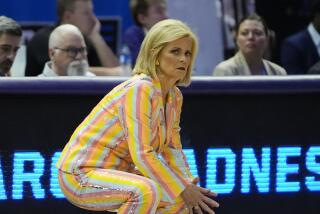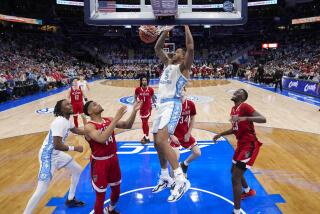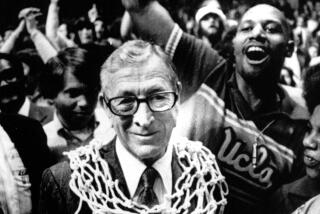Michigan-Louisville NCAA title game: Gratitude adjustment required
ATLANTA — Michigan will have three or four thank-you notes to hand out should it win Monday night’s national championship game against Louisville at the Georgia Dome.
It can start with Penn State, which beat the Wolverines by 14 points in State College on Feb. 27. Penn State, before that night, was 0-14 in Big Ten play.
That had to be a defibrillator-like shock to the system.
Michigan can thank the NCAA for tournament expansion and ditching the rule that once required that a team win its conference title or postseason tournament.
The Wolverines did neither in the Big Ten this season.
Most of all, with a bouquet of roses and a box of chocolates, Michigan can thank Kansas for blowing a 10-point lead with 2 minutes 19 seconds left in a South Regional semifinal.
It was the biggest collapse in Kansas since the end of football season. This was No.1-seeded Kansas, for goodness’ sake, not Canisius.
“You think it’s over,” Michigan guard Tim Hardaway Jr. said Sunday. “Your mind thinks it’s over, your body thinks it’s over.”
Michigan (31-7) is playing Louisville (34-5) for the title because Kansas left the barn door wide open and allowed Trey Burke to tie the score with a three-pointer in regulation. Michigan won in overtime.
Everybody loves Michigan . . . well, now.
Bill Frieder, realizing 24 years is a long time, introduced himself to current players Sunday as the man who coached the Wolverines for most of the 1989 championship season.
Frieder, of course, was fired just before the Wolverines’ run to their last NCAA title after it was learned he had accepted the Arizona State job.
Had Kansas not, frankly, choked, Michigan players would be watching Monday’s title game from their couches in Ann Arbor.
They would have been saying: That could have been us.
This is no knock on how Michigan got here — it’s just the beauty of the tournament.
Louisville qualified the old-fashioned way by winning the Big East regular-season and postseason titles. Rick Pitino’s Cardinals were seeded No. 1 overall entering the tournament and are riding a 15-game winning streak into the final game.
Yes, Louisville had to scramble back from a 12-point deficit against Wichita State on Saturday, but the Cardinals had 13 minutes to do it. You always sensed Louisville had the talent and experience to pull it off.
“I never think we’re going to lose,” Pitino said after the game.
Michigan’s escape against Kansas was much more Houdini-like.
“All we had to do is make one play,” Kansas Coach Bill Self lamented after the game. “. . . This one will be a tough one to get over.”
Again, Michigan thanks you.
Now that the Wolverines are here, though, they have every chance, and right, to win it all.
If Michigan wins after surviving a close call, it will also join a very long list.
“To make it to the national championship I do believe you have to be a little lucky,” Michigan forward Glenn Robinson III said. “You have to have some of those big breaks like we had because not everything is going to fall your way.”
Lucky breaks, bad calls and strange bounces are part of what makes the NCAA tournament different from a best-of-seven playoff series.
You can never discount the “whew” factor.
You think of UCLA as an unbeatable powerhouse on its way to a record 11 NCAA titles, but it wasn’t always the case.
UCLA would have only 10 banners had Tyus Edney not gone coast to coast for the winning basket against Missouri in 1995.
UCLA would have only nine titles if not for three daring escapes during John Wooden’s last title run in 1975. The Bruins required overtime to get out of the first round against Michigan, dodged Montana by three in the second and needed overtime, Richard Washington and three Hail Marys to get past Louisville in the national semifinals.
Jerry Tarkanian still credits the referees for UCLA’s 1971 title after his Long Beach State team lost by two in the regional at Salt Lake City.
And people forget the great Lew Alcindor-led UCLA team of 1969 barely sneaked by Drake in the national semifinals. Thank Lynn Shackelford for those late free throws.
Georgetown won the 1984 national title but only after tiptoeing by Southern Methodist, 37-36, in the second round.
In 1957, North Carolina needed three overtime periods to beat Michigan State in the national semis and three OTs to beat Kansas in the final.
One slip here . . . one slip there.
This year marks the 30th anniversary of the all-time, death-defying climb back from the brink of single-game elimination — North Carolina State’s miraculous run to the 1983 title.
The impossible title-game win over Houston was nothing compared with North Carolina State’s first-round win, in Corvallis, Ore., against a Pepperdine team coached by Jim Harrick.
North Carolina State trailed by six points with less than a minute to go in overtime. Pepperdine’s Dane Suttle, an 83.5% free-throw shooter, missed two front ends of one-and-ones. North Carolina State tied it and won in double overtime.
“Believe me, I still get questioned about, how did I miss?” Suttle told The Times in 2009. “. . . It wasn’t meant to be.”
Sometimes it isn’t, and sometimes it is.
Michigan won its only previous NCAA title, in 1989, in overtime, against Seton Hall.
“Having a chance to hang another one up for a national championship and getting ready to play tomorrow is all kind of surreal to us,” Robinson said.
Michigan in 1989 was seeded third and opened first-round play against No. 14 Xavier.
The sub-regional was in Atlanta. Michigan won by only five, 92-87.
Here we are in Atlanta again.
“Whew.”
More to Read
Go beyond the scoreboard
Get the latest on L.A.'s teams in the daily Sports Report newsletter.
You may occasionally receive promotional content from the Los Angeles Times.











